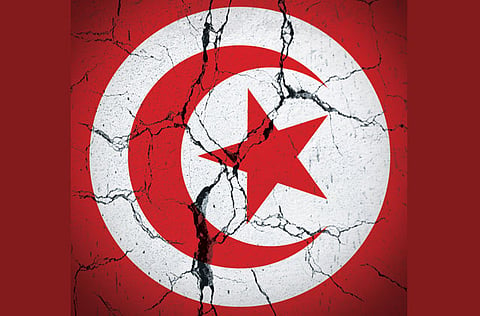Tunisia needs a leader, not preacher
The general feeling on the dusty streets is fatigue and frustration

‘It’s hard to start a revolution. Even harder to continue it. And hardest of all to win it. But, it’s only afterwards, when we have won, that the true difficulties begin. In short, Ali, there’s still much to do.’
— The Battle of Algiers (1966)
Tunisia is not Libya and it is not Algeria. It is much smaller and much safer, now and before, and it is definitely not used to violence. That is why the assassination of the opposition leader of the Popular Front, Shukri Belaid, last Wednesday, came as a shock to most Tunisians, while to the others, the murder was the culmination of months of stagnated transition that inevitably led to greater chaos.
Compared to Syria that has spiralled entirely out of control into a full-blown chaos, where international and regional interests have fuelled an increasingly confusing national struggle, neighbouring Libya, where Nato left a mess of competing militias and emerging warlords that would affect the stability of Mali, Tunisia remains a tranquil Mediterranean country. However, everything seems uncertain now.
Immediately after Belaid’s shooting, demonstrations erupted along the main artery of the capital — Habib Bourguiba Avenue — where the Ministry of Interior continues to operate behind barbed-wires. Like other ministries such as Higher Education, the leading Al Nahda party had placed an inexperienced member as minister, a modern form of Islamist cronyism.
Lack of experience of course leads to lack of effectiveness. Last autumn, surprisingly, rioters were somehow able to go north-west from the capital and ascend unhindered the sinewy roads to the posh neighbourhood of Sidi Bou Said to break into the US Embassy. In a controversial move, the presidential guards had to be sent to repel the rioters.
On other occasions, Islamist agitation was allowed to erupt and continue unrestrained, while other civil society initiatives to protest human rights violations, for example, were quickly subdued by the establishment. Over the past month, a Kuwaiti shaikh has gained fame for his “proselytising” preaching of the Quran and the ways of the Prophet [PBUH] to the Tunisians who are not so receptive.
Contrary to Tunisian tradition and culture, the Islamists have been pushing for little girls to wear the hijab in primary schools, but then again Zine Al Abidine Bin Ali had previously prohibited the veil, claiming to be modern and promoting women’s rights. France loved Bin Ali: From Francois Mitterrand to Nicolas Sarkozy, Tunisia was a favourite.
And so with French support, the double-edged sword persisted for years, until unemployment, poverty and lack of opportunity and general frustrations built up and boiled over into self-immolation and “revolution”. But even then, in tranquil Tunisia, only 300 people were killed, which seems a miracle compared to Syria.
A glimpse of the massive cultural village that Bin Ali had begun to build offers a snapshot of the grotesque amount of funds at his disposal from exploiting his people and national resources to constructing such awesome and ugly structures for elitist activities like operas and art exhibitions. The complex remains unfinished and empty.
In Tunisia, the rise of Al Nahda was the result of repression (Prime Minister Hamadi Jebali was in prison for 16 years, 10 of which in isolation) and grassroots support among and for fellow Muslims, but unlike the Palestinian Hamas, there is no excuse of being bombarded by Israel intermittently or being held hostage within a Mediterranean enclave indefinitely ...
There is no excuse for the transitional government to allow the destruction of more than 40 shrines in Tunisia. The infiltration of conservative Islam is nothing new: As depicted by the December 3, 1925, headline of the Al Kawn paper: ‘Al Saud destroying shrines of companies of Prophet [PBUH].
And someone was not looking when a young couple was stopped by Tunisian policemen for showing public display of affection in a parked car. The young man was taken away to get money to pay a fine for “intentional immoral behaviour”, while the other two policemen proceeded to rape the young woman. They were eventually charged for the felony, but so was she.
Back to symptomatic politics, any prime minister that walks around with his resignation letter in his inside jacket pocket as a bargaining chip against his opponents (and constituents) should reconsider his role in politics and society. This is what the Prime Minister of Tunisia, Hamadi Jebali, was doing: Bargaining for power with no experience in governance.
The Tunisians need a leader not a preacher. The general feeling on the dusty streets and smoky cafes is fatigue and frustration. The answer for most Tunisians — particularly for striving students and young professionals — is to move towards a more open future, not in religious groups playing politics.
Stuart Reigeluth is founding editor of Revolve magazine.


